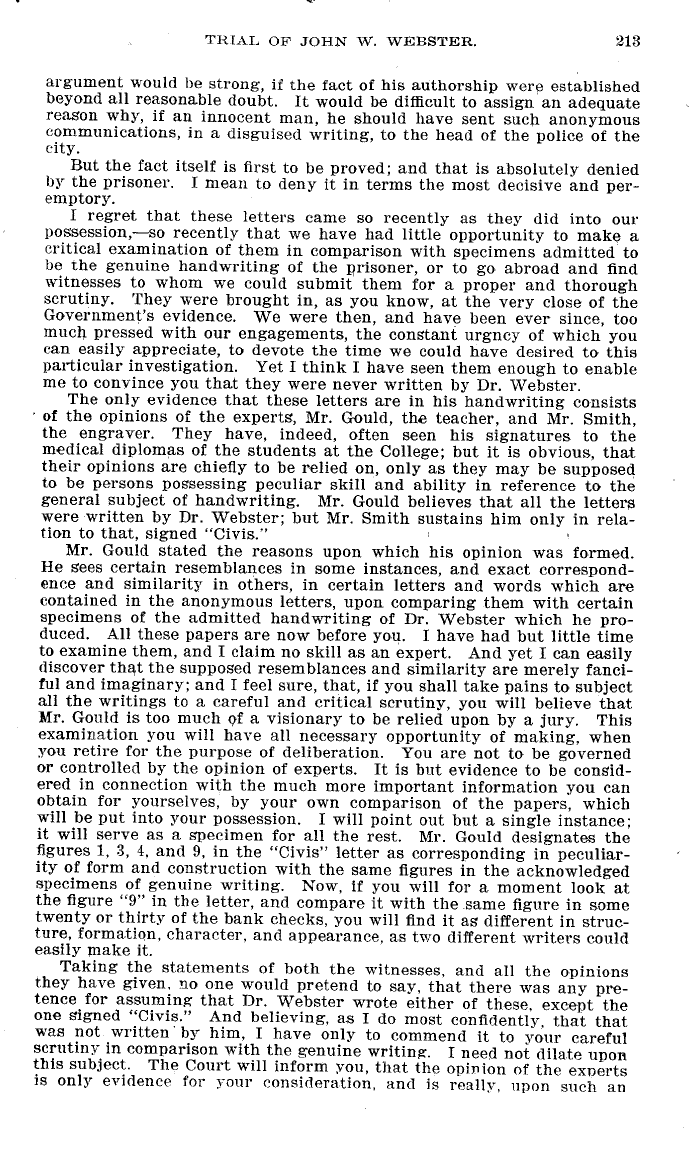|
TRIAL OF JOHN W. WEBSTER. 213
argument would be strong, if the fact of his authorship were established
beyond all reasonable doubt. It would be difficult to assign an adequate
reason why, if an innocent man, he should have sent such anonymous
communications, in a disguised writing, to the head of the police of the
city.
But the fact itself is first to be proved; and that is absolutely denied
by the prisoner. I mean to deny it in terms the most decisive and per-
emptory.
I regret that these letters came so recently as they did into our
possession,-so recently that we have had little opportunity to make a
critical examination of them in comparison with specimens admitted to
be the genuine handwriting of the prisoner, or to go abroad and find
witnesses to whom we could submit them for a proper and thorough
scrutiny. They were brought in, as you know, at the very close of the
Government's evidence. We were then, and have been ever since, too
much pressed with our engagements, the constant urgncy of which you
can easily appreciate, to devote the time we could have desired to this
particular investigation. Yet I think I have seen them enough to enable
me to convince you that they were never written by Dr. Webster.
The only evidence that these letters are in his handwriting consists
of the opinions of the experts, Mr. Gould, the teacher, and Mr. Smith,
the engraver. They have, indeed, often seen his signatures to the
medical diplomas of the students at the College; but it is obvious, that
their opinions are chiefly to be relied on, only as they may be supposed
to be persons possessing peculiar skill and ability in reference to the
general subject of handwriting. Mr. Gould believes that all the letters
were written by Dr. Webster; but Mr. Smith sustains him only in rela-
tion to that, signed "Civis."
Mr. Gould stated the reasons upon which his opinion was formed.
He sees certain resemblances in some instances, and exact correspond-
ence and similarity in others, in certain letters and words which are
contained in the anonymous letters, upon comparing them with certain
specimens of the admitted handwriting of Dr. Webster which he pro-
duced. All these papers are now before you. I have had but little time
to examine them, and I claim no skill as an expert. And yet I can easily
discover that the supposed resemblances and similarity are merely fanci-
ful and imaginary; and I feel sure, that, if you shall take pains to subject
all the writings to a careful and critical scrutiny, you will believe that
Mr. Gould is too much of a visionary to be relied upon by a jury. This
examination you will have all necessary opportunity of making, when
you retire for the purpose of deliberation. You are not to be governed
or controlled by the opinion of experts. It is but evidence to be consid-
ered in connection with the much more important information you can
obtain for yourselves, by your own comparison of the papers, which
will be put into your possession. I will point out but a single instance;
it will serve as a specimen for all the rest. Mr. Gould designates the
figures 1, 3, 4, and 9, in the "Civis" letter as corresponding in peculiar-
ity of form and construction with the same figures in the acknowledged
specimens of genuine writing. Now, if you will for a moment look at
the figure "9" in the letter, and compare it with the.same figure in some
twenty or thirty of the bank checks, you will find it as different in struc-
ture formation, character, and appearance, as two different writers could
easily make it.
Taking the statements of both the witnesses and all the opinions
they have given, no one would pretend to say, that there was any pre-
tence for assuming that Dr. Webster wrote either of these, except the
one signed "Civis." And believing, as I do most confidently, that that
was not written by him I have only to commend it to your careful
scrutiny in comparison with the genuine writing. I need not dilate upon
this subject. The Court will inform you, that the opinion of the experts
is only evidence for your consideration, and is really, upon such an
|

